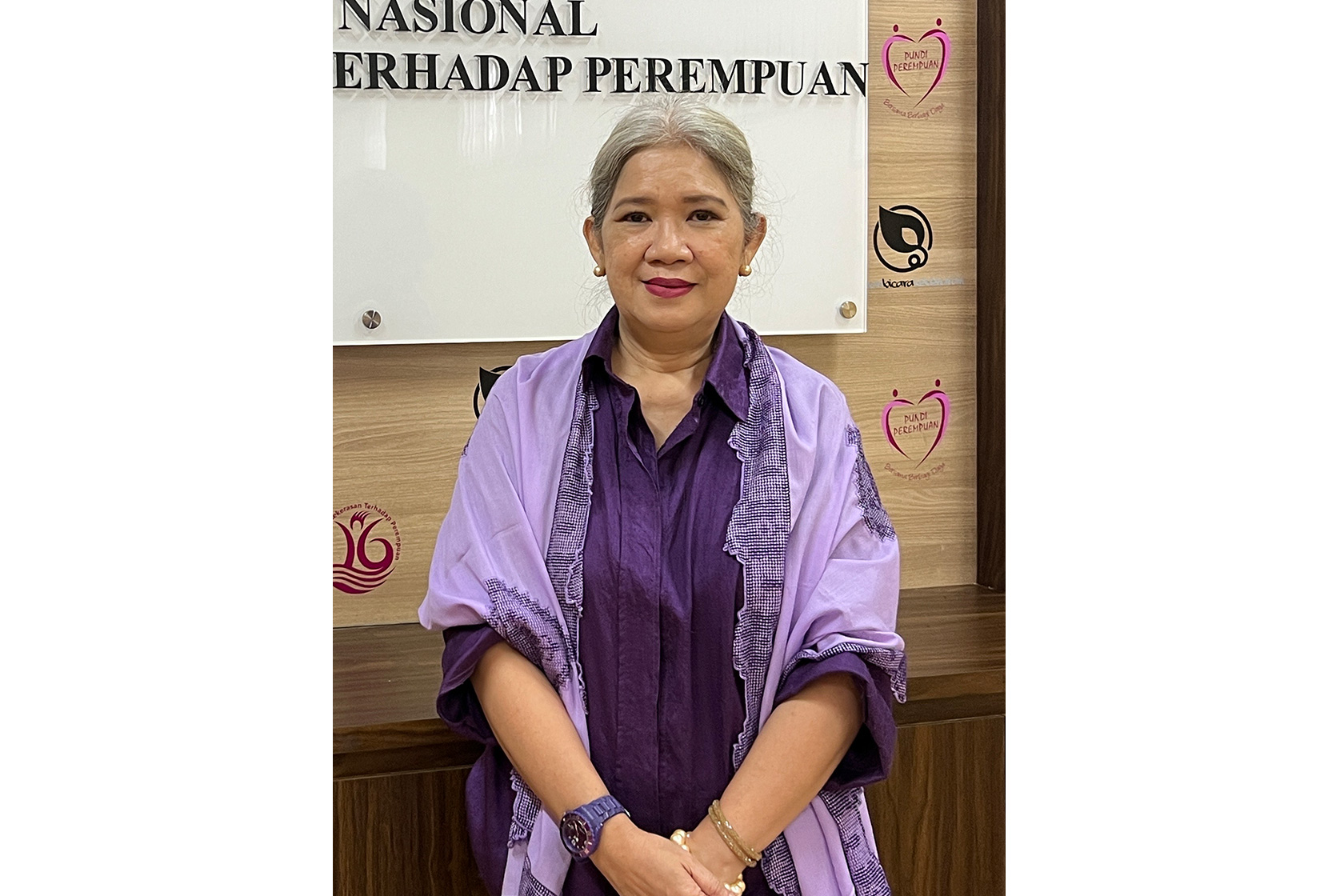The gradual advancement of women’s rights has a profound connection to the tireless advocacy work being done over many years by female activists, such as Heemlyvaartie D. Danes.
Known as Lilly, she has been the Secretary General of Indonesia’s National Commission on Violence Against Women (Komnas Perempuan) for a decade and has firsthand knowledge of the struggle for gender equality.
Lilly began her journey as a priest in the Gereja Masehi Injili (Evangelical Christian Church) in Minahasa before being posted to Jakarta in 1997 to be Head of the Women’s Bureau at the Communion of Churches in Indonesia (Persekutuan Gereja-gereja di Indonesia). She served until 2001. Over those four years, she became actively involved in many women's initiatives.
She cooperated with many interfaith women's movements, such as Fatayat Nahdlatul Ulama, Aisyiah, Catholic Women of the Republic of Indonesia (WKRI), Perwakilan Umat Buddha Indonesia, and Parisada Hindu Dharma Indonesia. She also participated in the Suara Ibu Peduli demonstration to spread awareness about violence against women.
"Those were difficult times because of the lead-up to and post-reformation. During that time, I became more aware of the vulnerability of women in conflict situations. There was a lot of violence against women at that time," said Lilly.
According to President Habibie's Joint Fact-Finding Team report on the May 1998 riots, there were 155 acts of sexual violence and abuse in Jakarta, Medan, and Surabaya. This resulted in the National Commission on Violence Against Women being established as an independent institution, which has continued to grow throughout the past 25 years. Lilly has dedicated herself to the institution since 2014.
In that time, Lilly has dealt with cases that are hard for her to forget, including the recently halted death penalties for women convicted of drug trafficking, Merry Utami and Mary Jane Veloso.
Both women’s executions were cancelled at the last minute, for Mary Jane in 2015 and Merry in 2016. Lilly remembers those sleepless nights and her relief when she finally had the courage to turn on the television and see the news that they had been spared.
"We truly believe they are female victims of human trafficking," said Lilly.
Amid her busy work to advance women's rights, Lilly took a break to expand her network and increase her knowledge. In 2018, she got the opportunity to take an Australia Awards Short Course titled Organisational Leadership and Management Practices for NGOs Empowering Women (MAMPU).
"I learned about human resource management for effective NGO work. That was very useful. Indonesia and Australia are alike on the subject of women's protection. It's just that in Australia, technology is quite advanced," said Lilly, referring to how NGOs can receive and document reports online.
The Protective Law
Following the reform movement in 1998, laws were enacted to protect women from violence. This began with the implementation of Law No. 23 of 2004 concerning eradicating domestic violence. The enactment of Law No. 21 of 2007 for the Eradication of the Crime of Human Trafficking was the next step. Later, Law No. 12 of 2022 on the Crime of Sexual Violence was implemented after a battle lasting over a decade.
The 2022 law recognises forms of sexual violence that were not covered under previous laws, including domestic rape. These categories were based on reports to the National Commission on Violence Against Women and service institutions. However, conservative groups opposed the bill because it did not outlaw sex outside marriage.
"It takes a very long time to protect women (with the law). We needed to confront a lot of obstacles. But we also needed to keep our well-being and spirits intact," said Lilly.
Lilly explained that there was a tradition of “being friends” at the commission. The commission’s staff regularly go out and meet those who need more information about gender justice. This includes members of Indonesia’s national legislature (DPR).
“(The bill was) rejected once, twice, three times - we still met with them," Lilly recalled.
Then, she, along with the commissioners and staff of the National Commission on Violence Against Women, persistently sought meetings with officials concerning this women’s issue.
"Early in the morning, we stood on the footpath without an appointment to meet one of the officials. Finally, we were asked to come in, and we asked for just 5 to 10 minutes to explain. And that was also an entry point to convince the government.”
When she witnessed hundreds of women marching in support of the Sexual Violence Crime Law in 2019, she was amazed by how many women were aware of the issue and wanted to express their concerns.
"Many women's movements, activists, as well as Komnas are bullied, they are said to be too liberal. (Critics of the bill) didn't even believe that there was such a thing as domestic rape," explained Lilly.
The struggle eventually paid off. However, the adoption of derivative regulation is still necessary for the implementation of the laws. In addition, law enforcement personnel must be educated about the law and their role in supporting victims.
This year, the National Commission on Violence Against Women held training on the elimination of sexual violence for law enforcement officers. "We hope that they can understand the victim's perspective and side with the victim in cases of violence against women," Lilly said.
Know The Law, Protect Victims
The global 16 Days of Activism Against Gender-Based Violence starts on November 25 and ends on Human Rights Day, December 10. This period was chosen to link violence against women and human rights symbolically and to emphasise that violence against women is a form of human rights violation.
The 16 Days of Activism was initiated by the Women's Global Leadership Institute in 1991, sponsored by the Center for Women's Global Leadership. The National Commission on Violence Against Women's involvement began in 2001. Lilly said the theme for its campaign this year was, 'Know the Law, Protect Victims'.
"This is a good opportunity to spread the word that there are at least three laws to protect female victims. This is a means for all communities and all stakeholders to learn more," said Lilly.
"Don't let any more officials make public speeches and make jokes about women's bodies. As women, we also need to understand that there are rules that can protect us from forms of verbal abuse too."


 Heemlyvaartie ‘Lilly’ D. Danes’ Decade-Long Advocacy Journey and the Struggle for Protective Laws
Heemlyvaartie ‘Lilly’ D. Danes’ Decade-Long Advocacy Journey and the Struggle for Protective Laws
